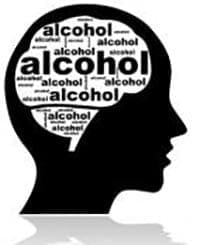From increased anxiety to the destruction of your brain’s dopamine receptors, frequent alcohol use brings a number of unpleasant side effects. In extreme cases, heavy drinking can reduce people to shadows of their former selves. Without getting too complex, let’s take a look at how alcohol rewires the brain.
What Happens to Your Brain When You Drink Alcohol?
Drinking affects your brain in a number of ways, but the results vary with time. For example, your brain looks different after a single night of cocktails than it might after a lifetime of nights of cocktails.
Short-Term Effects
 First of all, every drink you consume makes it more difficult for your cerebral cortex to function properly. This is the part of the brain that deals primarily with consciousness and awareness. Not surprisingly, many people’s sole reason for consuming alcoholic beverages is to reach an altered state of consciousness.
First of all, every drink you consume makes it more difficult for your cerebral cortex to function properly. This is the part of the brain that deals primarily with consciousness and awareness. Not surprisingly, many people’s sole reason for consuming alcoholic beverages is to reach an altered state of consciousness.
On a short-term basis, alcohol also affects parts of the brain such as the cerebellum and medulla. The former of these two regions is responsible for balance and movement. That explains why alcohol makes people dizzy and disoriented.
Long-Term Effects
Despite some of its unpleasant short-term effects, alcohol can effectively destroy your brain if abused over long periods of time. The parts of the brain which wear down the most over extended lengths of abuse are the hippocampus and amygdala.
The hippocampus is largely responsible for our senses of memory and contextual reasoning. Aging alcoholics commonly report a loss of long- and short-term memory, and they lose the situational awareness required to, figuratively, “put names to faces.” Imagine living a life that loses meaning as the years go by.
A healthy hippocampus helps us retain the important memories of our lives, but a healthy amygdala is very much necessary to live for those memories in the first place. This region of the brain is responsible for our most basic instinct: fight or flight. Over time, alcohol severely dampens the power of one’s amygdala, and it becomes increasingly difficult to stay out of harm’s way.
Even though a single night of heavy drinking puts undue stress on your brain, repeated abuse is how the most damage is caused. Turning to alcohol is never a viable way to overcome the challenges of life.
If you or a loved one is struggling and needing help, please contact Kolpia Counseling Services. Kolpia is a state licensed out-patient counseling center for substance use disorders. In addition to out-patient services, we offer a state certified DUII program, as well as mental health services.

Leave a Reply